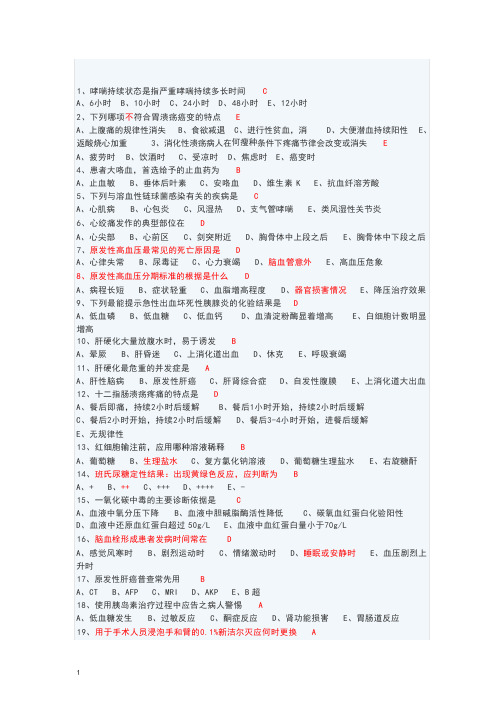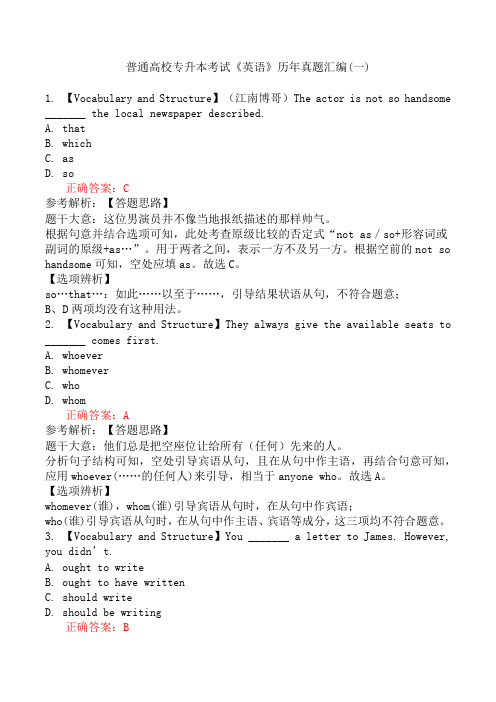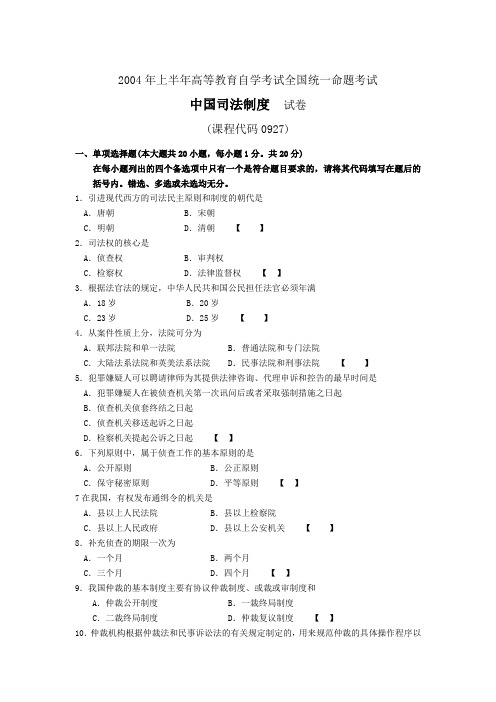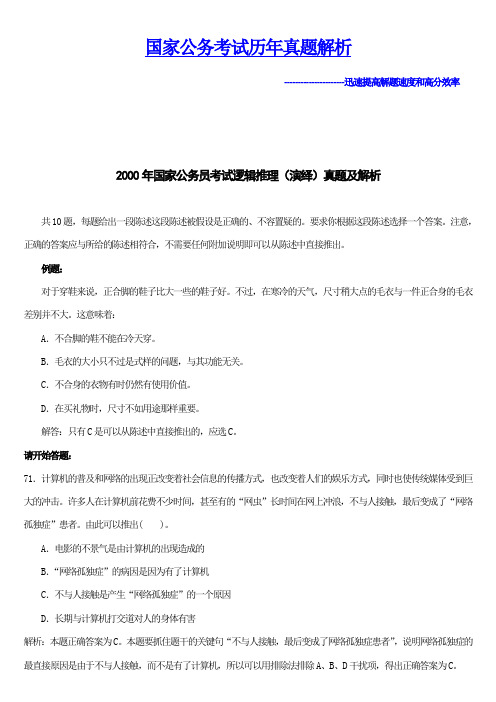历年考试真题集
历年护士资格考试真题精选

1、哮喘持续状态是指严重哮喘持续多长时间CA、6小时B、10小时C、24小时D、48小时E、12小时2、下列哪项不符合胃溃疡癌变的特点EA、上腹痛的规律性消失B、食欲减退C、进行性贫血,消D、大便潜血持续阳性E、返酸烧心加重 3、消化性溃疡病人在何瘦种条件下疼痛节律会改变或消失EA、疲劳时B、饮酒时C、受凉时D、焦虑时E、癌变时4、患者大咯血,首选给予的止血药为BA、止血敏B、垂体后叶素C、安咯血D、维生素 KE、抗血纤溶芳酸5、下列与溶血性链球菌感染有关的疾病是CA、心肌病B、心包炎C、风湿热D、支气管哮喘E、类风湿性关节炎6、心绞痛发作的典型部位在DA、心尖部B、心前区C、剑突附近D、胸骨体中上段之后E、胸骨体中下段之后7、原发性高血压最常见的死亡原因是 DA、心律失常B、尿毒证C、心力衰竭D、脑血管意外E、高血压危象8、原发性高血压分期标准的根据是什么DA、病程长短B、症状轻重C、血脂增高程度D、器官损害情况E、降压治疗效果9、下列最能提示急性出血坏死性胰腺炎的化验结果是DA、低血磷B、低血糖C、低血钙D、血清淀粉酶显着增高E、白细胞计数明显增高10、肝硬化大量放腹水时,易于诱发BA、晕厥B、肝昏迷C、上消化道出血D、休克E、呼吸衰竭11、肝硬化最危重的并发症是AA、肝性脑病B、原发性肝癌C、肝肾综合症D、自发性腹膜E、上消化道大出血12、十二指肠溃疡疼痛的特点是DA、餐后即痛,持续2小时后缓解B、餐后1小时开始,持续2小时后缓解C、餐后2小时开始,持续2小时后缓解D、餐后3-4小时开始,进餐后缓解E、无规律性13、红细胞输注前,应用哪种溶液稀释BA、葡萄糖B、生理盐水C、复方氯化钠溶液D、葡萄糖生理盐水E、右旋糖酐14、班氏尿糖定性结果:出现黄绿色反应,应判断为 BA、+B、++C、+++D、++++E、-15、一氧化碳中毒的主要诊断依据是CA、血液中氧分压下降B、血液中胆碱脂酶活性降低C、碳氧血红蛋白化验阳性D、血液中还原血红蛋白超过50g/LE、血液中血红蛋白量小于70g/L16、脑血栓形成患者发病时间常在 DA、感觉风寒时B、剧烈运动时C、情绪激动时D、睡眠或安静时E、血压剧烈上升时17、原发性肝癌普查常先用BA、CTB、AFPC、MRID、AKPE、B 超18、使用胰岛素治疗过程中应告之病人警惕AA、低血糖发生B、过敏反应C、酮症反应D、肾功能损害E、胃肠道反应19、用于手术人员浸泡手和臂的0.1%新洁尔灭应何时更换 AA 、使用40人次以后B 、每周更换一次C 、液体混浊后更换D 、每月更换一次E 、 使用50人次以后20、截瘫病人足部用支架的目的是 AA 、防止畸形B 、预防肌萎缩C 、防止关节僵直D 、病人舒适E 、防止下肢水肿21、下列哪项对高钾血症病人禁用 DA 、等渗盐水B 、10%葡萄糖液C 、右旋糖酐D 、林格液22、心脏复苏药最佳的给药途径是 CA 、心内注射B 、皮下注射C 、静脉注射D 、气管内给23、开放性损伤后预防破伤风的有效措施是 BA 、清创并注射青霉素B 、清创并注射破伤风抗毒素C 、注射破伤风类毒素D 、清创并注射破伤风类毒素E 、注射人体破伤风球蛋白24、墨菲氏征阳性见于 CA 、急性阑尾炎B 、急性胆管炎C 、急性胆囊炎D 、急性胰腺炎E 、胃十二指肠溃 疡急性穿孔25、两人协同对心跳骤停的患者进行心肺复苏时人工呼吸与心脏接摩的比例应为A 、2:5B 、2: 15C 、1:5D 、1:3E 、1: 15答案: C26、中年人便血及排便习惯改变应首先进行的检查是A 、纤维结肠镜检B 、钡灌肠C 、直肠镜检D 、直肠指检E 、大便常规答案: D27、排便时及排便后肛门剧烈疼痛,粪便表面有少量鲜血,应考虑为A 、一期内痔B 、二期内痔C 、肛裂D 、直肠息肉E 、血栓性外痔答案: C28、急性腹膜炎最重要体症是A 、腹胀B 、肠鸣音减弱C 、腹膜刺激症D 、肝浊音界缩小E 、移动性浊音答案: C29、不符合脑震荡表现的是A 、逆行性健忘B 、颅内压增高C 、意识障碍不超过30分钟E 、肌肉注射 E 、碳酸氢钠D、神经系统检查无异常E、脑脊液检查无异常答案:B30、下肢静脉曲张术后早期活动是为了防止A、患肢肿胀B、患肢僵直C、血管痉挛D、术后复发E、深静脉血栓形成答案:E31、急性胆管炎的 Charcot 三联症是A、黄疸,休克,昏迷B、黄疸,呕吐,休克C、腹痛,寒战高热,黄疸D、腹痛,寒战高热,呕吐E、寒战高热,黄疸昏迷答案:C32、判断颅底骨折,最有价值的临床表现是A、眼睑淤血B、球结膜下出血C、鼻孔流血D、脑脊液漏E、严重头痛答案:D33、乳癌根治术后,为预防皮下积液及皮瓣坏死的主要措施是A、半卧位B、引流管持续负压吸引C、加压包扎伤口D、抬高同侧上肢E、局部砂袋压迫答案:B34、甲亢病人术前准备最重要的是A、测定基础代谢率B、心理护理C、喉镜检查D、抗甲状腺药物和碘剂的应用E、钡餐和心电图检查答案:D35、观察休克病人每小时尿量,以下哪项表示组织灌流合适的最低限度A、20mlB、30mlC、40mlD、10mlE、50ml36、以迅速扩充血容量为目的时,下列液体中应选用A、低分子右旋糖酐B、中分子右旋糖酐C、5%葡萄糖等渗盐水D、10%葡萄糖液E、5%碳酸氢钠答案:B37、能预防局麻药中毒的术前用药是A、氯丙嗪B、异丙嗪C、阿托品D、哌替啶E、苯巴比妥钠答案:E38、广泛子宫切除和盆腔淋巴结清除术后留置尿管A、1-2天B、3-4天C、5-6天D、7-8天E、10-14天答案:E39、异位妊娠常发生的部位是A、卵巢B、宫颈C、腹腔D、输卵管E、子宫直肠陷凹答案:D40、羊水过多是指妊娠期羊水量超过A、1000mlB、2000mlC、3000mlD、4000mlE、5000ml答案:B41、下列哪项不是新生儿 Apgar 评分标准A、体温B、心率C、呼吸D、肌强力E、皮肤颜色答案:A42、葡萄胎术后要求随访的时间是B、2年C、3年D、4年E、5年答案:B43、引起婴幼儿缺铁性贫血的原因是A、体内贮铁不足B、铁的摄入不足C、生长发育快需铁量增加D、某些疾病的影响E、铁丢失过多答案:B44、肺炎患儿出现严重腹胀,肠鸣音消失是由于A、消化功能紊乱B、低钠血症C、中毒性肠麻痹D、低钾血症E、中毒性脑病答案:C45、新生儿败血症最常见的病原菌是A、厌氧菌B、葡萄球菌C、大肠埃希菌D、溶血性链球菌E、肺炎球菌答案:B46、关于生理性黄疸描述错误的是A、生后2-3天开始出现黄疸B、表现为食欲下降,哭声低弱C、一般7-14天自然消退D、早产儿可延迟三周消退E、血清胆红素浓度08年初级护师基础知识练习题(一)一、以下每一道题下面有 A、B、C、D、E 五个备选答案。
普通高校专升本考试《英语》历年真题汇编(一)

普通高校专升本考试《英语》历年真题汇编(一)1. 【Vocabulary and Structure】(江南博哥)The actor is not so handsome _______ the local newspaper described.A. thatB. whichC. asD. so正确答案:C参考解析:【答题思路】题干大意:这位男演员并不像当地报纸描述的那样帅气。
根据句意并结合选项可知,此处考查原级比较的否定式“not as/so+形容词或副词的原级+as…”。
用于两者之间,表示一方不及另一方。
根据空前的not so handsome可知,空处应填as。
故选C。
【选项辨析】so…that…:如此……以至于……,引导结果状语从句,不符合题意;B、D两项均没有这种用法。
2. 【Vocabulary and Structure】They always give the available seats to _______ comes first.A. whoeverB. whomeverC. whoD. whom正确答案:A参考解析:【答题思路】题干大意:他们总是把空座位让给所有(任何)先来的人。
分析句子结构可知,空处引导宾语从句,且在从句中作主语,再结合句意可知,应用whoever(……的任何人)来引导,相当于anyone who。
故选A。
【选项辨析】whomever(谁),whom(谁)引导宾语从句时,在从句中作宾语;who(谁)引导宾语从句时,在从句中作主语、宾语等成分,这三项均不符合题意。
3. 【Vocabulary and Structure】You _______ a letter to James. However, you didn’t.A. ought to writeB. ought to have writtenC. should writeD. should be writing正确答案:B参考解析:【答题思路】题干大意:你本该给詹姆斯写一封信的。
芜湖龙山街道历年招聘考试真题

芜湖龙山街道历年招聘考试真题1. 易地扶贫搬迁群众由迁入地负主体责任,迁出地配合迁入地开展防止返贫监测帮扶工作。
() [单选题] *对(正确答案)错2. 实施"两改两治理”主要是强化社会治理能力建设。
() [单选题] *对错(正确答案)3. 脱贫户家庭人口数按年度周期内实际在户的家庭成员计算,其中自然增减人口按实际在户月数(增加人员新增当月不计,减少人员减少当月计)除以12个月计算。
() [单选题] *对错(正确答案)4. 驻区工作队和第一书记主要职责是结对帮扶。
() [单选题] *对错(正确答案)5. 我省学习浙江“千万工程”的抓手是“四在农家·美丽乡村“创建活动。
() [单选题] *对错(正确答案)6. 我省工资性收入扣减必要就业成本时采集人员可自行确定交通费、食宿费扣减标准。
() [单选题] *对错(正确答案)7. 赡养收入计入转移性收入,据实计算,农户认可,赡养(抚养、扶养)协议可以作为佐证() [单选题] *对(正确答案)错8. 养殖的猪、种植的高梁已被公司收购,但尚未付款,可以计入收入算账。
()[单选题] *对错(正确答案)9. 产业奖补资金支付到户后计入生产经营性收入。
() [单选题] *对错(正确答案)10. 规范做好脱贫人口收入信息动态管理,确保真实准确反映脱贫人口收入情况,是一项严肃的政治纪律,也是一项严肃的工作纪律。
() [单选题] *对(正确答案)错11. 脱贫户享受的村级集体经济分红应计入财产性收入。
() [单选题] *对(正确答案)错12. 产业奖励、就业奖励是指按照“多干多补、少干少补、不干不补”的原则,以激发脱贫群众内生发展动力、促进稳定增收为目的。
() [单选题] *对(正确答案)错13. 脱贫人口收入要采集生活类支出,用于抵扣支出的专项补贴不计收入。
()[单选题] *对错(正确答案)14. 计入脱贫人口收入的项目应具有相对稳定性和可持续性特征,一般应为农户实际获得的、可自由支配的货币收入。
2004.4--2011.4-自考00927《中国司法制度》历年真题集(完美整理版)

2004年上半年高等教育自学考试全国统一命题考试中国司法制度试卷(课程代码0927)一、单项选择题(本大题共20小题,每小题1分。
共20分)在每小题列出的四个备选项中只有一个是符合题目要求的,请将其代码填写在题后的括号内。
错选、多选或未选均无分。
1.引进现代西方的司法民主原则和制度的朝代是A.唐朝 B.宋朝C.明朝 D.清朝【】2.司法权的核心是A.侦查权 B.审判权C.检察权 D.法律监督权【】3.根据法官法的规定,中华人民共和国公民担任法官必须年满A.18岁 B.20岁C.23岁 D.25岁【】4.从案件性质上分,法院可分为A.联邦法院和单一法院 B.普通法院和专门法院C.大陆法系法院和英美法系法院 D.民事法院和刑事法院【】5.犯罪嫌疑人可以聘请律师为其提供法律咨询、代理申诉和控告的最早时间是A.犯罪嫌疑人在被侦查机关第一次讯问后或者采取强制措施之日起B.侦查机关侦套终结之日起C.侦查机关移送起诉之日起D.检察机关提起公诉之日起【】6.下列原则中,属于侦查工作的基本原则的是A.公开原则 B.公正原则C.保守秘密原则 D.平等原则【】7在我国,有权发布通缉令的机关是A.县以上人民法院 B.县以上检察院C.县以上人民政府 D.县以上公安机关【】8.补充侦查的期限一次为A.一个月 B.两个月C.三个月 D.四个月【】9.我国仲裁的基本制度主要有协议仲裁制度、或裁或审制度和A.仲裁公开制度 B.一裁终局制度C.二裁终局制度 D.仲裁复议制度【】10.仲裁机构根据仲裁法和民事诉讼法的有关规定制定的,用来规范仲裁的具体操作程序以及仲裁当事人之间权利义务的行为规则,称为A.仲裁法 B.仲裁规则C.仲裁制度 D.仲裁协议【】11.执行机关据以执行的生效法律文书主要是由A.国家权力机关作出 B.国家审判机关作出C.国家检察机关作出 D.国家行政机关作出【】12.在我国,死刑由A.人民法院法警执行 B.人民检察院法警执行C.武装警察部队战士执行 D.公安干警执行【】13.在民事执行中,提出执行异议的人,是指A.诉讼参加人 B.其他诉讼参与人C.当事人 D.案外人【】14.目前我国对司法行政机关领导干部的管理体制是A.双重领导,以地方党委为主 B.双重领导,以地方政府为主C.地方党委单一领导 D.地方政府单一领导【】15.司法所(司法办公室)隶属于A.省级人民政府 B.省辖市人民政府C.县级人民政府 D.乡镇人民政府和街道办事处【】16.我国律师全部义务的核心是A.保守秘密 B.依法纳税C.依法维护当事人的合法权益 D.乡镇人民政府和街道办事处【】17.中国司法行政制度的概念之外延主要有法律形态、实践形态和A.理论形态 B.思想形态C.历史形态 D.严格形态【】18.以下选项中,不属于公证管辖的种类的是A.地域管辖 B.专属管辖C.协商管辖 D.指定管辖【】19.我国法律援助工作的最高领导机构是A.司法部 B.国家法律援助委员会C.国家法律援助中心 D.中国法律援助基金会【】20.关于人民调解的原则,以下选项中不正确的是A.依法调解原则 B.依职权调解原则C.自愿平等原则 D.尊重当事人诉讼权利原则【】二、多项选择题{本大题共5小题,每小题2分,共10分)在每小题列出的五个备选项中有二个至五个是符合题目要求的,请将其代码填写在题后的括号内。
国家公务员考试逻辑推理历年真题集(含解析和答案)

国家公务考试历年真题解析----------------------迅速提高解题速度和高分效率2000年国家公务员考试逻辑推理(演绎)真题及解析共10题,每题给出一段陈述这段陈述被假设是正确的、不容置疑的。
要求你根据这段陈述选择一个答案。
注意,正确的答案应与所给的陈述相符合,不需要任何附加说明即可以从陈述中直接推出。
例题:对于穿鞋来说,正合脚的鞋子比大一些的鞋子好。
不过,在寒冷的天气,尺寸稍大点的毛衣与一件正合身的毛衣差别并不大。
这意味着:A.不合脚的鞋不能在冷天穿。
B.毛衣的大小只不过是式样的问题,与其功能无关。
C.不合身的衣物有时仍然有使用价值。
D.在买礼物时,尺寸不如用途那样重要。
解答:只有C是可以从陈述中直接推出的,应选C。
请开始答题:71.计算机的普及和网络的出现正改变着社会信息的传播方式,也改变着人们的娱乐方式,同时也使传统媒体受到巨大的冲击。
许多人在计算机前花费不少时间,甚至有的“网虫”长时间在网上冲浪,不与人接触,最后变成了“网络孤独症”患者。
由此可以推出( )。
A.电影的不景气是由计算机的出现造成的B.“网络孤独症”的病因是因为有了计算机C.不与人接触是产生“网络孤独症”的一个原因D.长期与计算机打交道对人的身体有害解析:本题正确答案为C。
本题要抓住题干的关键句“不与人接触,最后变成了网络孤独症患者”,说明网络孤独症的最直接原因是由于不与人接触,而不是有了计算机,所以可以用排除法排除A、B、D干扰项,得出正确答案为C。
72.有一份选择题试卷共6个小题,其得分标准是:一道小题答对得8分,答错得O分,不答得2分,某位同学得了20分,则他( )。
A.至多答对一道题 B.至少有三个小题没答C.至少答对三个小题 D.答错两个小题解析:本题正确答案为D。
此题只需要清楚一个例子,就是要得20分可以是答对两道题,答错2道,不答两道这么一种可能情况。
然后,应用此例子逐个排除。
首先A说至多答对一道题,可见可以排除掉;B至少三道没有答,意思是有三道或者三道以上没答,可以排除;C至少答对三道,也可以排除;随后得出D是正确答案。
四川公务员考试历年真题集

四川省各级机关考试录用公务员和机关工作人员行政职业能力测验试卷第一部分言语理解与表达(共20题,参考时限20分钟)本部分包括三种类型的试题:一、选词填空:共5题。
要求你从所给的四个选项中选出一个填空,使句子的意思表达得最准确。
请开始答题:1.我国实行的是土地公有制,土地是国家的重要资源和资产。
把土地无偿划拨给企业,或者以优惠政策的形式提供给企业,是国有资产的一种巨大( )。
A.转移B.流动C.流失D.损失2.在强大的习惯面前,科学有时也会变得( )。
A.一无是处B.苍白无力C.软弱可欺D.似是而非3.他耐心地听取了同志们的( )批评,终于接受了大家的建议。
A.严肃B.严正C.严格D.严重4.有些人说了许多似乎很有道理的话,却让人摸不着边际;有些人只说了一两句,却有( )之效。
A.相见恨晚B.穿云破雾C.醍醐灌顶D.如释重负5.享受奉献带来的( )和( )是人生的一大幸福。
A.快乐荣耀B.欢喜荣耀C.欢喜荣誉D.快乐荣誉二、语句表达:共5题。
要求你从语气、词序、语法结构等方面对有关语句做出判断。
请开始答题:6.从给出的几句话中选出没有歧义的句子( )。
A.我们需要相信自己的人B.最后出席会议的教授的弟子作了精彩的发言C.我和小王已经商量好了,下了课去打球D.没有人相信他的话7.下列没有语病的一句是( )。
A.为了使大家有一个舒适的工作环境,我们把工厂打扫得干净而又整齐B.航天飞机也能完成天地往返,但每一次航行,都要进行大量的部件更换C.听说爱乐乐团正在市体育馆演出,大家立即奔向演出地点跑去D.当你有了崇高的理想,会使你藐视一切困难8.下列语句没有语病的是( )。
A.为了全面推广利用菜籽饼或棉籽饼喂猪,加速发展养猪事业,这个县举办了三期饲养员技术培训班B.可惜,这部在他心中酝酿了很久,即将成熟的巨著未及完稿,就过早地离开了我们C.储蓄所吸收储蓄额的高低对国家流动资金的增长有重要的作用,因而动员城乡居民参加储蓄是积累资金的重要手段D.不难看出,这起明显的错案迟迟得不到公正判决,其根本原因是党风不正在作怪9.下列各句中,没有语病的一句是( )。
全国导游考试历年真题
全国导游考试历年真题一、判断题(请将正确答案填涂在答题卡上相应题号中,每小题1分,共5分)1、旅游行业的核心价值观是“游客为本,服务至诚”() [单选题] *A.正确(正确答案)B.错误2、1954年4月15日,中国国际旅行社在北京成立,这是中国的第一家旅行社,同时也标志着新中国第一批导游的诞生。
() [单选题] *A.正确B.错误(正确答案)3、1841年,英国人托马斯·库克组织了570人从斯特到拉夫巴勒参加禁酒大会,并专门配备了向导,这是世界上第一次提供商业性导游服务的旅游活动。
() [单选题] *A.正确B.错误(正确答案)4、旅游团就餐时,地陪要引领旅游者进餐厅就座,简单介绍餐馆及菜肴特色后就可离开让他们就餐。
就餐期间,导游人员不应打扰旅游者。
() [单选题] *A.正确B.错误(正确答案)5、全陪与领队、地陪商定行程时,应将各自持有的旅行计划进行对照,一般以组团社的接待计划为依据。
() [单选题] *A.正确B.错误(正确答案)二、单项选择题(下列各题给出的答案只有一个是正确的,请将正确答案填涂在答题卡上相应题号中,每小题1分,共25分)1、若送乘坐乘国内航班离站的团队客人,若乘坐国内航班,应提前( ) 小时抵达机场。
乘国际航班离站,应提前( ) 小时到站。
如乘火车离站,应提前( ) 小时到站。
() [单选题] *A、2 3 1(正确答案)B、2 2 1C、2 3 1.5D、2 2 1.52、以下()不是散客自助游的特点。
[单选题] *A、人数少,规模小B、自主性强,自主安排旅游行程C、旅游中所需要的各项服务都为自助或半自助D、自由度大、变化小、要求少(正确答案)3、地陪带领团队游客前往景点参观旅游出发前,导游应提前()分钟抵达集合地点。
[单选题] *A、10(正确答案)B、15C、20D、304、导游员的第一次亮相是在() [单选题] *A、接站时B、致欢迎词时(正确答案)C、首次沿途导游时D、清点人数时5、中国旅行社的英文简称是()。
2024年社会工作者(中级)-社会综合能力考试历年真题摘选附带答案版
2024年社会工作者(中级)-社会综合能力考试历年真题摘选附带答案第1卷一.全考点押密题库(共100题)1.(单项选择题)(每题 1.00 分) 下列选项中,()不属于在后期成熟阶段小组及小组成员的一般特点。
A. 小组的凝聚力大大增强B. 组员对小组充满了信心和希望C. 组员关系的亲密程度更高D. 组员之间常会出现角色冲突2.(单项选择题)(每题 1.00 分) 在志愿服务人力资源管理内容中,保险、表扬、其他志愿者联系活动属于()管理职能。
A. 规划B. 组织C. 领导D. 控制3.(单项选择题)(每题 1.00 分) 通过制订和切实有效地执行规章与公约,确保社区居民遵循社会规范和社会价值,指的是社区的()。
A. 社区教育功能B. 心理支持功能C. 社会控制功能D. 社会参与功能4.(单项选择题)(每题 1.00 分) 在问卷设计中,设计者要注意题数适当,一般在被调查者()分钟内完成为宜。
A. 5~10B. 10~15C. 15~20D. 20~305.(多项选择题)(每题 2.00 分) 在一次团体督导会议上,资深社会工作者老张向5位新人职的社会工作者介绍精神障碍人士的一般特征,他讲授的内容应包括精神障碍人士的()。
A. 人际交往B. 心理和行为表现C. 家庭关系D. 分析和处理问题能力E. 相关政策保障措施6.(单项选择题)(每题 1.00 分) 社会工作者运用任务中心模式开展治疗时,注重鼓励服务对象积极表达自己的想法和意见,并给予服务对象及时回馈,使服务对象体会到社会工作者的关心和尊重。
这属于沟通行为的()要素。
A. 有层次B. 有系统C. 有组织D. 有反应7.(多项选择题)(每题 2.00 分) 精神分析治疗过程分为()。
A. 治疗情境B. 治疗关系C. 治疗性对话D. 治疗方式的选择E. 治疗时间的确定8.(单项选择题)(每题 1.00 分) 1925年,()建立社会学与社会服务系被视为我国社会工作发展的重要标志。
2023年电工(技师)考试历年真题摘选三套集锦(附带答案)荟萃3
2023年电工(技师)考试历年真题摘选三套集锦(附带答案)(图片大小可自由调整)全文为Word可编辑,若为PDF皆为盗版,请谨慎购买!第壹卷一.全能考点(共50题)1.【单选题】变频器设定升速时间的基本原则是:在电动机的启动电流不超过的前提下,尽可能地缩短升速时间。
A、允许值B、额定值C、最大值D、有效值参考答案:A2.【单选题】为了保证晶闸管准确、适时、可靠地被触发,对触发电路的要求是:应有足够大的触发电压,一般触发电压为伏。
A、2~4B、4~6C、4~8D、4~10参考答案:D3.【判断题】()为防止并联电容器过负荷,应装设过负荷保护装置。
参考答案:×4.【单选题】真空的磁导率为。
A、4π×10-7B、4π×10-8mC、4π×10-10D、4π×10-12H/m参考答案:A5.【单选题】1KV及以上移相电容器两极对地绝缘电阻,在室温下通常大于多少。
A、1000MΩB、3000MΩC、5000MΩD、10000MΩ参考答案:C6.【多选题】该图为某配电箱接地体的设置情况,在施工现场能作为接地体的材料有()A、角钢B、钢管C、光面圆钢D、螺纹钢E、水管参考答案:ABC7.【判断题】()从运算放大器电路的组成来看,它是一个性能优良的直接耦合直流放大器,所以,被广泛用于直流放大电路和用作直流放大器。
参考答案:×8.【单选题】6KV绝缘棒的交流耐压标准为。
A、20KVB、35KVC、44KVD、55KV参考答案:C9.【判断题】()放大器的输入电阻是从放大器输入端看进去的等效电阻,它是个交流电阻。
参考答案:√10.【单选题】变频器的抗干扰措施有隔离、滤波、屏蔽、接地、加电抗器和等。
A、漏电保护B、合理布线C、装熔断器D、电容器参考答案:B11.【单选题】下面()是海因里希事故连锁理论事故发生过程中的五个部分。
A、遗传及社会环境;人的缺点;人的不安全行为和物的不安全状态;事故;伤害B、遗传及社会环境;人的缺点;直接原因;事故;伤害C、管理缺陷;环境缺陷;人的不安全行为和物的不安全状态;事故;伤害D、基本原因;间接原因;人的不安全行为和物的不安全状态;事故;损失参考答案:A12.【判断题】射极输出器的输出电压总是大于其输入电压。
深圳市事业单位历年考试真题
2022年深圳市事业单位招聘历年考试真题(满分100分时间120分钟)一、单选题(每题只有一个正确答案,答错、不答或多答均不得分)1.为了维护政令一致,凡下行公文()。
A.都与有关部门联合发文B.内容涉及其他机关的职权范围时,行文前应与其协商一致C.都要向上级请示D.都要和有关机关协商【答案】:B2.下列哪部是鲁迅的散文集:()A.《朝花夕拾》B.《故乡》C.《野草》D.《呐喊》【答案】:A3.《三国演义》中的“三英战吕布”的“三英”指的是:()A.刘备,关羽,张飞B.赵云,张飞,关羽【答案】:A4.××县人社局以×社字〔2015〕第15号文件向省委、省政府行文,请求增加预算费用,并抄送财务科。
下列说法错误的是()。
A.该文属越级行文B.主送机关正确C.发文字号错误D.抄送机关错误【答案】:B- 1 -5.撰写批复,开头应写明()。
A.下级机关的工作情况B.针对请示的日期与标题C.国家的有关法规D.上级机关的指示【答案】:B6.公文的写作应()。
A.灵活B.丰富C.含蓄D.规范【答案】:D7.《关于××学校修建实验大楼的请示》,作者应是()。
A.签发文件的校长B.起草文件的校办秘书C.××学校的小班主任D.××学校【答案】:D8.资本有机构成的提高意味着()A.可变资本的比重增大B.不变资本和可变资本按相同比例下降C.不变资本和可变资本按相同比例上升D.不变资本的比重增大【答案】:D9.决定商品价值量的是()A.超额劳动时间B.社会必要劳动时间C.个别劳动时间D.剩余劳动时间【答案】:B10.货币的基本职能是()- 2 -A.流通手段和支付手段B.价值尺度和流通手段C.贮藏手段和世界货币D.价值尺度和贮藏手段【答案】:B11.我国最早的一部长篇章回体历史演义的小说是()。
A.《水浒传》B.《西游记》C.《三国演义》D.《红楼梦》【答案】:C12.提高最低工资标准可能带来的影响,不包括()。
- 1、下载文档前请自行甄别文档内容的完整性,平台不提供额外的编辑、内容补充、找答案等附加服务。
- 2、"仅部分预览"的文档,不可在线预览部分如存在完整性等问题,可反馈申请退款(可完整预览的文档不适用该条件!)。
- 3、如文档侵犯您的权益,请联系客服反馈,我们会尽快为您处理(人工客服工作时间:9:00-18:30)。
1. There are two windows in the bedroom. _____ of them face south, overlooking a beautiful park.A. BothB. OneC. The twoD. Either2. ‗I‘d like some more bananas.‘‗I‘m sorry, there is ____ left.‘(2000)A. noB. someC. fewD. none3. It was at the music hall ____ we met each other for the first time. (2000)A. whenB. whereC. whichD. that4. ____ that the family had taken with them was one bottle of orange. (2001)A. AnythingB. EverythingC. WhatD. All5. ____ he first heard of the chemist. (2001)A. That was from the teacher thatB. It was the teacher whomC. It was from the teacher thatD. That was the teacher whom6. I asked two people to help me start my car, but ___ of them knew how to do. (2002)A. eitherB. noneC. bothD. neither7. –The phone is ringing. ---Who would ____ be? It is already midnight. (2002)A. heB. itC. thisD. there8. In need of money, Bob had to take _____ job that was offered to him. (2003)A. whateverB. no matter whatC. whicheverD. no matter which9. My friends and I would like to go to the concert, but _____ of us has got a ticket. (2003)A. bothB. noneC. neitherD. all10. The two players had been warned of the danger, but _____ of them seemed to take it seriously.A. bothB. neitherC. anyD. either (2004)11. It was on August 15, 1945 _____ the Chinese people won the final victory in the Anti-Japanese War. (2004)A. thatB. whichC. untilD. while12. You can choose _____ apples, oranges, or bananas. (2006)A. allB. bothC. eitherD. neither13. Jackie could sing and play the piano, while I could do ____. (2007)A. anyB. bothC. eitherD. neither14. There are five language labs in this building. One is on the second floor and ____ on the third floor. (2008)A. otherB. the otherC. other fourD. the others15. Over a hundred people expressed their worries, but ____ were willing to help. (2009)A. someB. manyC. fewD. little16. –Have you got a camera? –No, I should buy ____. (2010)A. itB. oneC. thatD. this答案:1-5: ADDDC 6-10: DBABB 11-16:ACDDC B1. The weather changes ______ the season. (1991)A. byB. withC. forD. from2. I don‘t quite remember the key ____ the question though I answered it correctly.A. ofB. toC. forD. about (1993)3. Bob was upset when he found that they had gone to the party ____ him. (1994)A. exceptB. withoutC. besidesD. beside4. I learned German when I was a child, but now I have forgotten everything __ a few expressions. (1997)A. instead ofB. besidesC. except forD. about5. Would you like a piece of cake ____ your coffee? (1999)A. withB. toC. forD. in6. When the taxi came I put out my hand, but it just went ____ me without stopping.A. offB. overC. throughD. past (2000)7. The Yangtze is the longest river in China, ___ which some more bridges have been built in the past few years. (2001)A. ontoB. throughC. aboveD. over8. This street is usually quiet, but it will get very busy ___ Sunday morning. (2004)A. onB. inC. atD. during9. It began to rain, and Johnson put a light plastic raincoat ___ his jacket. (2008)A. atB. inC. overD. above10. First draw a line ___ the middle of the page. Then write a word in the space above the line. (2009)A. acrossB. overC. betweenD. within11. What do you imagine the child uses this old tool ____? (2010)A. aboutB. byC. forD. ofKeys: 1-5: BBBCA 6-11: DDA CAC历年考试真题之-----情态动词1. ―Where‘s the butter?‖―It ___ in the box. I put it there just now.‖(1996)A. would beB. should beC. could beD. may be2. Lisa did not come for the piano lesson yesterday. She ___ have missed the bus.A. wouldB. mightC. shouldD. ought to3. ―Must I return the book to the library in a week?‖―No, you ___.‖(1994)A. couldn‘tB. mustn‘tC. needn‘tD. won‘t4. The house is dark and quiet, so the Browns ____ have gone to bed. (1996)A. mustB. shouldC. ought toD. would5. Mr. Zhang isn‘t here yet. I think he ___ about the meeting. (1993)A. should have forgotB. ought to forgetC. must have forgotD. may not forget6. She earns a good salary, so she ____ be deep in debt. (2001)A. can‘tB. mustC. needn‘tD. should7. –Listen, Mary is singing in the next room.–That ___ be Mary. She is in hospital. (1997)A. may notB. shouldn‘tC. wouldn‘tD. can‘t8. ―Why isn‘t John in class?‖―He ____ be sick, or he‘d have been here already.‖A. shouldB. mayC. mustD. would (1998)9. ―Shall I tell Ann the test results?‖―No, you ____. She‘s already got the results.‖A. wouldn‘tB. needn‘tC. mustn‘tD. shouldn‘t (1999)10. Why is the rubbish still here? It ought to ___ yesterday. (2000)A. be thrown awayB. have thrown awayC. have been thrown awayD. throw away11. They all look so happy. They ____ have succeeded in persuading their teacher.A. canB. willC. mustD. would (1995)12. –You realize that you were driving at 100 miles per hour, don‘t you? (2002)--No, officer. I ____ have been. This car can‘t do more than 70.A. needn‘tB. shouldn‘tC. couldn‘tD. might not13. They started off at about 5 o‘clock in the morning. They should ___ there by now.A. arriveB. have been arrivingC. have arrivedD. be arriving (2002)14. You ___ have seen Jane in her office last Friday. She‘s been out of town for two weeks. (2003)A. couldn‘tB. mustn‘tC. wouldn‘tD. shouldn‘t15. –It is so noisy upstairs. What are they doing?–They ___ be having a party. (2004)A. couldB. shouldC. wouldD. must16. –My watch stopped.–You ___ have forgotten to wind it. (2005)A. shouldB. mustC. canD. may17. I was caught in a heavy rain. I ___ have brought an umbrella. (2006)A. couldB. shouldC. mustD. would18.—Who do you think has make my room so dirty, Mum? (2010)–It be your younger brother.A. mustB. shallC. willD. would19. I can‘t find my notebook in the room. I have left it in the library last night.A. ought toB. wouldC. shouldD. must (2011) Keys: 1-5: BBCAC 6-10: ADCBC 11-15: CCCAD 16-19: BBAD历年真题之---被动语态1. He told me that the number of students to be admitted ___ at that time. (2009)\A. had not been decided onB. were not decided onC. has not been decided onD. are not decided on2. –Why are you so late, Jim?–Sorry. We ___ in heavy traffic for about an hour. (2005)A. have stuckB. are stuckC. stuckD. were stuck3. Although he ____ those days, Mr. Black never gave up hope. (2004)A. treated unfairlyB. was unfairly treatedC. has unfairly treatedD. has been unfairly treated4. The situation is quite serious and will become even worse unless some measures ___. (2004)A. had been takenB. will be takenC. were takenD. are taken5. It is recorded that in 1892 the weather became so cold that the river __ over. (2010)A. freezesB. was freezingC. has frozenD. froze6. –What are you looking for?–I can‘t remember where I ___my glasses. (2008)A. would leaveB. leaveC. had leftD. left7. The secretary won‘t tell you when her boss __ back from abroad. (2007)A. is comingB. has comeC. will comeD. would come非谓语动词1. It was really kind ___ you to help me with my homework. (2006)A. aboutB. forC. ofD. to2. The toys are all so pretty. I don‘t know ___ one to choose. (2007)A. thatB. whatC. whichD. whose3. All books are ___ to the library before Friday. (2007)A. returnedB. to be returnedC. to have returnedD. to return4. You can borrow that bicycle if you ___. (2008)A. want toB. want itC. want to doD. will want5. With such a lot of work ___, Mr. Jordan really had no time to look after his wife and daughter. (2008)A. doneB. doingC. to doD. having done6. The manager had Ms. Brunel ___ the new assistant around yesterday. (2009)A. to showB. showedC. showingD. show7. After working for two hours, I found ___ impossible to complete the paper in time.A. meB. thisC. thatD. it (2009)8. It was very kind of you to clean the office, though you ___. (2009)A. needn‘t doB. wouldn‘t haveC. didn‘t have toD. mustn‘t have to9. The President gave the Secretary of State 30 days ___ the report. (2010)A. completesB. to completeC. completingD. completed10. The boy spent the whole morning ___ possible answers to the question. (2002)A. discussB. and discussingC. discussingD. and discussed11. In this park, sparrows often fly down from trees to eat from visitors‘ hands. They are used to __ in this way. (2002)A. be fedB. feedC. having fedD. being fed.12. ___ any friends in the city, he fell quite lonely and helpless. (2003)A. No to haveB. No havingC. Not to haveD. Not having13. –Who is the person ___ with our monitor over there?–Our new maths teacher. (2004)A. talkedB. to talkC. talkingD. talks14. My roommate said that he didn‘t mind ___ the window open at night. (2004)A. keepB. keepingC. to keepD. having kept15. Don‘t worry about Susan, she just feels like ____ home alone tonight. (2005)A. to stayB. stayC. stayingD. having stayed16. Don‘t forget __ your mom tomorrow. (2006)A. callingB. to callC. to have calledD. having called17. He is busy ___ his suitcase. (2008)A. packB. to packC. packingD. packed18. ___ there like that, you remind me of your father. (2009)A. To sitB. Being sittingC. SittingD. Sit19. I wrote a letter to the car dealer, ___ what had happened to my new car. (2010)A. explainingB. to explainC. explainsD. explained20. The speaker, _____ for his speeches, was warmly received by the students. (2010)A. knownB. to be knownC. having knownD. being known21. Dr. White was away to the South last month, so he didn‘t attend the meeting __in Beijing. (2003)A. having heldB. to holdC. to be heldD. held22. Jack was the sort of man who did not like his action ____. (2008)A. be questionedB. questioningC. having questionedD. questioned23. The cinema, _____ last month, is very popular, especially among the young people. (2000)A. openedB. to openC. opensD. having opened24. Many things _____ impossible in the past are quite common today. (2001)A. having been consideredB. to be consideredC. consideringD. considered25. It‘s such a big room. If you don‘t speak loud enough, you‘ll never make yourself ___. (2002)A. hearB. hearingC. to hearD. heard26. With all his homework _____, the boy was allowed to watch TV. (2004)A. to finishB. finishedC. to be finishedD. having finished27. As we know, Xu Haifeng won the first gold medal for China at the 23rd Olympic Games _____ in Los Angeles. (2005)A. being heldB. to be heldC. having been heldD. held28. Michael used to look nervous when ______. (2006)A. scoldB. to be scoldedC. scoldingD. scolded29. ____ with our small flat, Bill‘s house looks like a palace. (2007)A. ComparedB. ComparingC. CompareD. To compare1-5: CCBAC 6-10: DDCBC 11-15: DDCBC 16-20: BCCAA21-25: DDADD 26-29: BDDA主谓一致与倒装句1. I visited Jiuzhaigou last autumn. Never in my life ____ so beautiful a place like that.A. I had beenB. did I seeC. had I seenD. I shall see (2000)2. Ten days ___ long enough for Mr. Carter to finish his design. He doesn‘t need any more. (2000)A. isB. has beenC. wasD. had been3. He talked at the top of his voice, ___ he drew nobody‘s attention. (2000)A. insteadB. soC. yetD. though4. Not only you but also I ____ mistaken. (2001)A. amB. hadC. wereD. have5. I‘m not naturally a morning person, _ I have three clocks set for about 6 am. (2001)A. becauseB. soC. thoughD. for6. Catherine is one of the brightest students who _____ from the department of Computer Science, Brown University. (2002)A. is graduatedB. has graduatedC. are graduatedD. have graduated7. Not until he finished his homework ___ him to watch TV in the evening. (2002)A. his mother allowedB. his mother had allowedC. did his mother allowD. had his mother allowed8. These three English novels are for you. The rest ___ for the other students in your class. (2003)A. wereB. isC. areD. was9. So little ___ about European history that the lecture was quite beyond me. (2004)A. did I knowB. I knewC. do I knowD. I know10. Speak louder, ____ you won‘t make yourself heard in such a big room. (2004)A. butB. andC. orD. for11. In China, every boy and girl ____ a right to education. (2004)A. haveB. hasC. will haveD. had12. Not until very late that afternoon ______ the news that his daughter won the match.(2005)A. did the father getB. the father gotC. the father did getD. got the father13. Neither my wife nor I _ able to persuade our daughter to change her mind. (2005)A. amB. areC. have beenD. is14. Work hard ___ you will overcome the difficulties. (2008)A. andB. soC. butD. for15. My husband and I both go to work, ___ we share housework at home. (2010)A. forB. soC. yetD. or16. ___ in the letter did the young man say anything about his mistake. (2010)A. AnywhereB. EverywhereC. NowhereD. SomewhereKeys: 1-5: CACAB 6-10: DCCAC 11-16: BAA ABC简单句式1. --‗Have you seen Ann at the concert?‘--‗No, but she said she would come, ___?‘(1991)A. didn‘t sheB. wouldn‘t sheC. did sheD. would she2. Be careful next time, ____? (1993)A. don‘t youB. are youC. will youD. aren‘t you3. --―Jane wasn‘t in when Jack came, was she?‖–― ___, but she returned a few minutes later.‖(1999)A. No, she wasB. No, she wasn‘tC. Yes, she wasD. Yes, she wasn‘t4. Let‘s do the cleaning right after class, ___? (1995)A. will youB. shall weC. do youD. can we5. ___ lovely weather we have been having these days! (2000)A. HowB. WhatC. How aD. What a6. --___ do you record the temperature in the lab?–Every two hours. (2000)A. How soonB. How longC. How oftenD. How much7. ____! Let‘s go out for a walk along the river bank. (2001)A. What a fine dayB. What fine dayC. How fine dayD. How a fine day8. Let‘s visit the bookstore on our way back home, ___? (2002)A. shan‘t weB. won‘t youC. shall weD. will you9. There used to be a coffee shop next to your house, ___? (2002)A. wasn‘t thereB. didn‘t thereC. wasn‘t itD. didn‘t it10. –How ___ will you be able to finish the painting? –In a couple of hours. (2003)A. soonB. oftenC. longD. fast11. Henry never said that he was good at maths, ___ he? (2003)A. wasB. didC. didn‘tD. wasn‘t12. --___will he finish writing his new novel? –In a couple of weeks, I think. (2004)A. How fastB. How soonC. How oftenD. How long13. The bag is very heavy. Come and lend me a hand, ___? (2009)A. should youB. do youC. can youD. will you1-5: ACBBB 6-10: CACAA 11-13: BBD名词性从句1. ___is still unknown when the president is going to make a public speech. (1991)A. WhichB. ThatC. ItD. What2. The weather here changes so often that you can‘t tell ___ it will be like that next day. (1993)A. howB. thatC. whatD. if3. Her brother never expected that the police ___ the lost bicycle. (1993)A. foundB. could findC. findD. will find4. __ she will be given the job is still under discussion. (1995)A. AlthoughB. WhetherC. IfD. What5. ___doesn‘t matter what you do at this point. (1997)A. ThatB. ThisC. ItD. What6. The manager invited me here. Could you tell me ___, please? (1998)A. his office where isB. where his office isC. where is his officeD. his office is where7. ___ books you borrow from the library should be returned in two weeks‘ time.A. WhateverB. WhichC. No matter whatD. What (1998)8. We can easily get from the computer ___ has been stored in it. (1999)A. whatB. thatC. whichD. anything9. It‘s suggested that ___ a while before we make a decision. (2000)A. she waitedB. she waitC. she waitsD. she will wait10. The photos will show you ___ the house __ like. (2000)A. what does…likeB. what…looksC. how does…lookD. how…looks11. I‘m sure he understands ___ you feel. He‘s very clever. (2001)A. whenB. whatC. whetherD. how12. Don‘t forget the fact ___ he was not at home that night. (2004)A. whyB. whichC. thatD. whether13. ___ we did was calling Susan to tell her we wouldn‘t be back till Tuesday. (2006)A. HowB. ThatC. WhatD. Which14. __knows the fact should report it to the police. (2007)A. AnyoneB. No matter whoC. SomeoneD. Whoever15. I wonder ___ we could have a talk after the meeting. (2008)A. whichB. whyC. thatD. if16. Jack told his daughter that she could have ___ she wanted for Christmas. (2009)A. whichB. whateverC. thatD. wheneverKeys: 1-5: CDBBC 6-10: BAABB 11-16: DCC DDB状语从句1. Her dog ran out of the yard the old lady opened the gate.A. momentB. a momentC. the momentD. that moment2. As soon as she open the letter, Mrs. White will find out what had happened to her husband.A. tearsB. is tearingC. will tearD. has torn3. The thief had disappeared the boy could stop him.A. asB. onceC. beforeD. until4. Please be sure to telephone me next time you to our city.A. will comeB. comeC. cameD. are coming5. Peter was about to unlock the door he found someone had broken into the room.A. onceB. beforeC. whenD. than6. He remained silent, her heart was heavy and her spirit low.A. soB. thoughC. forD. therefore7. Hard as he worked, he couldn‘t make enough money to support his family.A. andB. butC. thereforeD. /8. at his paper over the weekend, Neil didn‘t finish it.A. As he worked hardB. Hard as he workedC. How he worked hardD. How hard he worked9. That was matter that I had no choice but to talk it over with my parents.A. a such seriousB. a so seriousC. such seriousD. so serious a10. the government agrees to give extra money, the theatre will have to be closed next month.A. UnlessB. IfC. SinceD. As11. Something must be done immediately if these wild animals saved.A. will beB. wereC. are about to beD. are to be12. I won‘t be able to attend the meeting I‘ll be on holiday with my family.A. ifB. sinceC. thoughD. while13. at his model plane over the weekend, he didn‘t completed it.A. As he worked hardB. Hard as he workedC. How he worked hardD. How hard he worked14. I enjoy listening to Miss White, my English teacher, I can only understand about half of what he says.A. whenB. becauseC. ifD. though15. The Greens chose to live life was cheap, and they moved to a small town years ago.A. ifB. untilC. whenD. where16. It was beautiful weather that we spent the whole day in the park. (2011)A. reallyB. soC. suchD. very17. David won‘t come to my wedding party I send him an invitation.(2011)A. whenB. unlessC. asD. afterKeys: 1-5: CACBC 6-10: CDBDA 11-17: DBBDD CB定语从句:1. Our concert turned out to be a great success, they had never expected.A. whatB. thatC. whenD. which2. August 15, 1999 is one of the greatest days in his life he was accepted by a university.A. whileB. thatC. whichD. when3. Next weekend he will visit the airbase he worked 25 years ago.A. whenB. asC. whereD. which4. has been pointed out before, air pollution is becoming more and more serious in large cities.A. ThatB. WhatC. WhichD. As5. Have you ever been to the square was built last year?A. whichB. whereC. whenD. what6. On our way to Washington D. C., we visited the Browns, used to be our neighbour.A. whomB. whichC. whoD. that7. This is the washing machine we had so much trouble.A. at whichB. with whichC. of whichD. in which8. The teachers decided to put off the meetings till next week, they won‘t be so busy.A. sinceB. asC. whenD. while9. George cooked me a meal, was a first for him.A. whatB. whenC. whoD. which10. I looked around for a place I could buy some chocolate, but everywhere was closed.A. andB. thereC. whenD. where11. The nurse held a small child face I didn‘t see clearly.A. whichB. thatC. whoseD. who12. Joe took his friends there by a shortcut, reduced the drive from 50 minutes to 15.A. whereB. whichC. thatD. what13. You could look for a job in big cities workers are better paid.A. whereB. whenC. whoseD. thatKeys: 1-5: DDCDA 6-10: CBCDD 11-13: CBA。
